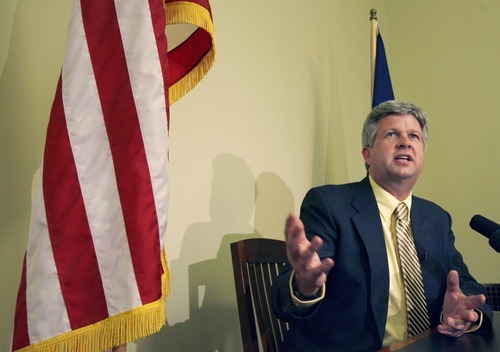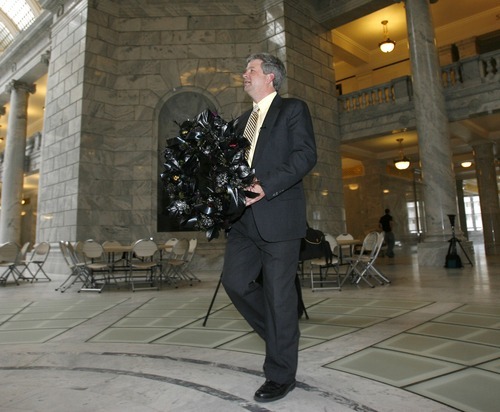This is an archived article that was published on sltrib.com in 2011, and information in the article may be outdated. It is provided only for personal research purposes and may not be reprinted.
The good news in wake of the passage and signing of HB477, the new state records law, is that Utah is still more transparent than Kazakhstan.
The bad news is that when the bill becomes law on July 1, the Beehive State will be by far the most secretive in the nation, according to the Society of Professional Journalists.
The society's national chapter presented its first-ever Black Hole Award to the Utah Legislature and Gov. Gary Herbert Wednesday afternoon. David Cuillier, the chairman of SPJ's Freedom of Information Committee, flew to Salt Lake City to make the capitol hill presentation.
HB477 will amend the state's Government Records Access and Management Act.
"There is no other law like it. This is by far the worst legislation we've ever seen. And we follow these things closely," said Cullier, a professor of journalism at Arizona State University. "And the way they sneaked it through, maybe they anticipated it wouldn't be popular."
Neither the governor nor any lawmakers were on hand to receive the award.
The governor's spokeswoman, Ally Isom said Tuesday the Black Hole Award is undeserved because the governor delayed the law's implementation so it could be fine tuned.
House Speaker Becky Lockhart, R-Provo, said Wednesday that HB477 will be the subject of a special legislative session before it takes effect on July 1.
There are many things wrong with the legislation, Cuillier said. But three things stand out.
First, the "expansive and arbitrary" copy fees will price citizens out of records. Second, new exemptions will keep a "wide swath" of electronic records secret. Last, but most important, is a requirement that citizens must prove the records they seek should be public.
"That turns the law on its head. The presumption has always been that records are open unless the government could demonstrate otherwise," Cuillier said. "It allows any government agency to keep anything secret unless you can challenge it in court."
Utah's GRAMA had been a good law, Cuillier said. He had ranked Utah 13th in access to government records. Now, Utah is 51st among all states and the District of Columbia on his scale of transparency. Beyond that, he said, if HB477 becomes law, Utah will be more secretive than Mexico, Albania, Azerbaijan and even Kyrgyzstan.
The law will damage democracy as we know it, that Arizona State professor said.
"If we don't know what our government is up to, we might as well give up and have a dictatorship," he said. "It's time to get outraged."
No black hole in WVC
West Valley City is aiming for more transparency in how it deals with public records and its residents.
On Monday, at 10 a.m., West Valley City Mayor Mike Winder and the West Valley City Council will announce changes to the city's website and other city efforts to increase transparency. The Sutherland Institute and the Utah Foundation for Open Government will join city leaders.
West Valley City Director of Public Relations Aaron Crim said Wednesday that the changes will improve the city's openness with the public.
"We have always strived to have one of the best websites," Crim said. "This is just the culmination of a number of the city's efforts to be as transparent as possible."
Crim added that West Valley City received a B- on the Sutherland Institute's most recent government transparency report, and hopes to get an A+ rating next time for its updated website and other changes.
Cimaron Neugebauer





